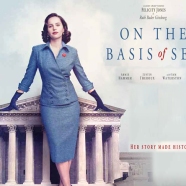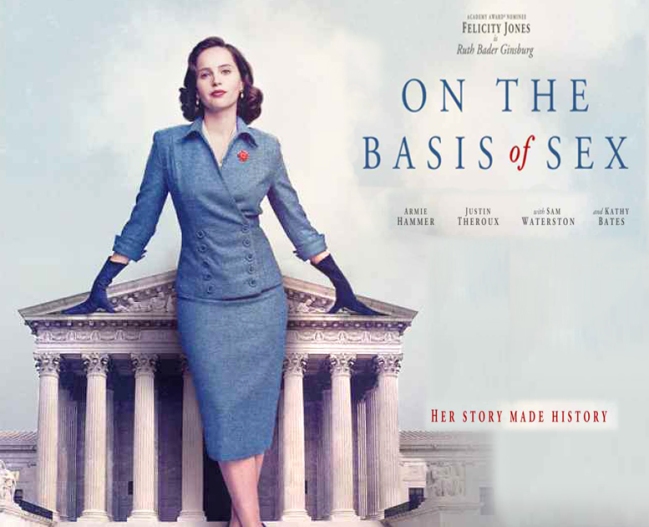 February
18
February
18
Tags
On The Basis of Sex (2018)

History is what powerful white men have written over countless centuries. Contemporary cinema fills in the blanks, giving voice to the previously marginalised. This is the open space in which On the Basis of Sex (2018)has been made. The film, however, is also a reminder that an important film is not the same as a great one.
Any bio-pic about US Supreme Court Justice Ruth Bader Ginsberg (Felicity Jones) can only add to the history of feminism and jurisprudence. The story provides a broad-brush picture of her early personal life and focuses in particular on her first major courtroom victory. It opens with wide-eyed Ruth in her first year at Harvard Law School when her husband Martin (Arnie Hammer) learns he has cancer. Although she has an infant child and a sick husband to care for, Ruth covers his lectures as well as her own so both can progress in their degrees. A feisty feminist, she gains an early reputation for standing up to male authority.
The story flashes forward a few years to 1970: Martin is in remission and a successful lawyer, while Ruth is a Columbia Law School academic. She is a pioneer for teaching women in law and aspires to challenge the US Constitution’s deeply entrenched discrimination on the basis of sex. She learns of an unusual case where the male appellant is the sole carer of his elderly mother. He has been denied a modest pension because the law presumes carers are female. Ruth rightly believes the case will become a landmark in anti-discrimination law reform.
As a biographic drama, most of the facts are drawn from history but the film itself struggles to tell the story with clarity and authenticity. Legally trained viewers may follow dense legal argument, but others might glaze over and rely on the usual narrative ploy that pitches a valiant female reformer against the dinosaur male establishment. The story glosses over some facts and overplays others. For example, Ruth was the first woman to achieve a full professorship in law and her role at Columbia influenced countless young women, yet when her academic role is mentioned it is as something of an aspirational let-down. The famous courtroom drama in which she co-presents alongside her charismatic husband depicts her in a prolonged stumbling of argument. Yet Justice Ginsberg insists to this day “I never stumbled”: portraits of feminine weakness are never out of fashion.
A picky reviewer might wonder whether disjointed editing is meant to take the place of dramatic tension or ask if Ruth’s #MeToo style assertiveness rings true for the ‘70s. Some may notice that her too worldly-wise daughter looks more like a sister, and others might ask where one can find such a saccharine sweet-smart husband who always says exactly what a poet-philosopher might imagine. Such trivial matters aside, this still is an important and worthwhile film, but maybe a good story that could have been told better.

Director: Mimi Leder
Stars: Felicity Jones, Arnie Hammer, Justin Theroux

I just saw this film last week. I came to it with a slightly off-taste attitude, as I wondered why we needed this depiction of RBG after the masterly documentary about her life earlier last year. There was a lot packed into this movie, which caused a lot of things to get glossed over. One detail was a copy of the Idaho Statesman, Boise’s most famous (if no longer best) daily paper, with the headline about Idaho attorney Allen Derr’s role in Reed vs Reed, a pivotal case in RBG’s arguments.
The arguments and concepts in the court case seemed to fly by with the rapidity of a machine gun and I left the movie wondering if I would understand it all better by reading the screenplay. It seems to me that this court case is really what the movie should be about, not necessarily RBG. (Which, explains the title) But these days, Americans cling (rightfully) to any reference to RBG as the last beacon of hope in a morass of sewage.
Your review is, as always, well balanced and reliable.
LikeLiked by 1 person
Thanks for sharing those very interesting observations. I’m glad I’m not the only one who felt that the legalise was being shot out “with the rapidity of a machine gun”. My biggest disappointment was with the rather plastic hero and heroine doll portraits which were too Hollywood and distracting from the remarkable achievements of RBG.
LikeLike
Yes. That’s well put. Doll portraits. Did you see the documentary? It was far better.
LikeLiked by 1 person
No, but once again you have added to my back-list viewing.
LikeLiked by 1 person
I totally agree with your review – ‘an important film is not the same as a great one’ is the perfect summary!
LikeLiked by 1 person
Thanl you Florence.
LikeLike